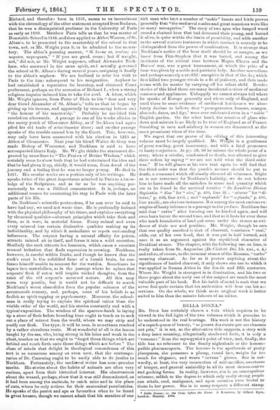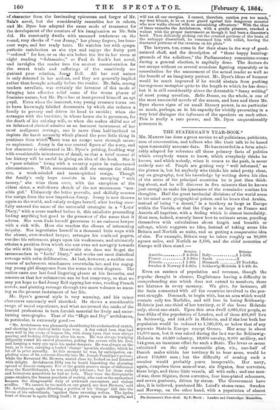BELLA DONNA.*
Ma. Dime has certainly chosen a title which requires to be viewed in the full light of the two volumes which it precedes to be understood in its real bearings. His work is not the history of a superb queen of beauty, " se jouant des cceurs que see charmes ont prix," it is not, as the alternative title suggests, a story with a deep inner meaning, allegorically shadowed forth, it is only a "romance" from the mysogynist's point of view, and, finally, the title has no reference to the deadly nightshade or the homoeo- pathic pharmacopoeia. The heroine is the apotheosis of pretty plumpness, she possesses a plump, round face, weighs fur too much for elegance, and wears "sevens'' gloves. She is out- wardly, at least, the very incarnation of self-sacrifice, sweetness of temper, and general amiability in all its most demonstrative and gushing forms. In reality, however, she is an unscrupulous. schemer, selfish to the degree to which only really strong people can attain, cool, malignant, and upon occasion even brutal to• those iu her power. She is in many respects a different stamp • Bella Donna; or. the Cron Wore the Name. A Rimance, by Gilbert Dyee.. London : Bentley. 1884.
of character from the fascinating epicurean and forger of Mr.
Sala's novel, but she considerably resembles her in others, and Mr. Dyce has adopted the same mode of treatment for the development of the creature of his imagination as Mr. Sala did. He constantly dwells with assumed tenderness on the round, rosy cheeks of " our Jenny," her plump fingers, her inno- cent ways, and her ready tears. He watches her with sympa- pathetic satisfaction as she sips and enjoys the fruity port
" ordered " for her, or as she sits before the fire in her room at night reading " Salammbo," or Paul de Kock's last novel,
and inveigles the reader into the acutest commiseration for the secret trials and sufferings of the sensitively or- ' ganized poor relation, Jently Bell. All her real nature is only detected in her actions, and they ar•e generally implied rather than brought actually before the reader. Mr. Sala, among modern novelists, was certainly the inventor of this mode of
bringing into effective relief some of the worse phases of feminine nature, but Mr. Dyce has at least proved himself an apt
pupil. Even when the innocent, rosy young creature turns out
to have knowingly falsified documents by which she reduces a family to poverty and drives its head to suicide ; when she
arranges with the barrister, in whose house she is governess, for the death of his existing wife, or when she makes skilful use of an infatuated clerical admirer• as an innocent instrument of her• most malignant revenge, one is more than half-inclined to deplore the harsh necessity which placed the poor little thing in positions from which' here was no escape save through means so unpleasant. Jenny is the one central figure of the story, and
her character is elaborated in Mr. Dyce's petting, fondling way with considerable minuteness of detail, so that a brief resume of
her history will be useful in giving an idea of the book. She is a "poor relation" living with a country squire in embarrassed
circumstances. With consummate skill she entraps the eldest son, a weak-minded and mean-spirited ensign. Though the family's only hope consists in his marrying " with
money," she wins them over, with the exception of the eldest sister, a well-drawn sketch of the not uncommon "sen- sible girl." Ultimately the latter• prevails, and skilfully rescues the ensign from the now imperious Jenny. Jenny is now thrown again on the world, and calmly resigns herself, after having care- fully entered the name of the successful strategist in a " Letts' Diary," with a cross marked before it, this cabalistic proceeding boding anything but good to the possessor of the name that it adorns. She soon finds herself governess to an eminent lawyer
with a sick wife. Here she reaches the climax of interesting iniquity. She ingratiates herself in a thousand little ways with the absent, over-worked lawyer, arranges his confused papers, verifies his references, plays upon his weaknesses, and ultimately
attains a position from which she can even act savagely towards the wife with impunity. Meanwhile she does not forget the memorandum in "Letts' Diary," and works out most diabolical revenge with calm deliberation. At last, however, a sudden con- course of unforeseen mischances overwhelm her•, and the engag- ing young girl disappears from the scene in utter disgrace. The author casts one last fond lingering glance at his favourite, and assures us that her submersion can be but temporary, so that we may yet hope to find Jenny Bell sipping her wine, reading French novel;, and plotting revenge through two more volumes as amus- ing as the present instalment of her life.
Mr•. Dyce's general style is very amusing, and his minor characters extremely well sketched. He shows a considerable range of social exparionce, and what are termed the ranks of the
learned professions in turn furnish material for lively and enter- taining monographs. That of the "High and Dry" archdeacon, in particular, is extremely good :— " Mr. Archdeacon was pleasantly shouldering his ecclesiastical crutch, and showing how clerical fields wore won. A dry caked face, that had been well in the ovens of human life, with sharp eyes, that wore always peering and looking diligently after his men. He was always trudging diligently round his sacred preserves, poking the covers with his foot, and keeping a wary eye upon his under-keepers. He was always on the beat, as it wore, carrying a loaded 'charge' upon his shoulder, which he let off in print annually. At this moment ho was, by anticipation, ex- ploding some of its contents directly into Mr. Joseph Franklyn's person; while the Reverend Mr. Blowers, seated close by, looked on and listened with delight. Archdeacon Dilly can be heard lamenting the alarming spread of dissent-rampant. For of the gentle passive shape of difference from the Establishment, he was amiably tolerant ; but for these rude and boisterous anarchists he had no love. They were the disreputable game-stealers, the brazen poachers of society, who cast on the authorized keepers the disagreeable duty of awkward encounters and violent scuffles. We cannot be too much on our guard, my dear Blowers,' said Mr. Archdeacon, again directing a portion of his charge' full into the bosom of his subordinate, ' against these ravening wolves. The hydra head of dissent is again lifting itself ; it grows apace in strength, and will tax all our energies. I cannot, therefore, caution you too much,* my dear friends, to be on your guard against this dangerous monster who now walks abroad with an astonishing effrontery.' With the close of these remarks the Archdeacon, with a gentle pressure, craoked a walnut with the proper instrument as though it had been a dissenter's head. Then delicately picking out the crushed portions of the brain of the unhappy dissentient, he consumed him with relish, leaving the fractured portions of the cranium on his plate."
The lawyers, too, come in for their share in the way of good- natured chaff, and the description of "those happy hunting- grounds of the solicitors," the Parliamentary committee-rooms during a general election, is capitally done. The doctors do not escape without on several occasions figuring separately or in consultation for the amusement of the actual reader as well as the benefit of an imaginary patient. Mr. Dyce's ideas of humour would be much improved if he would abstain from pushing incongruous metaphor• quite to the length to which he has done; but it is still considerably above the detestable " funny writing"
of most young novelists. Bella Donna, on the whole, is one of the most successful novels of the season, and here and there Mr.
Dyce shows signs of no small literary power, in no particular
so much, perhaps, as in his capacity for vividly presenting in a very brief dialogue the influences of the speakers on each other.
This is really a rare power, and Mr. Dyce unquestionably possesses it.

































 Previous page
Previous page